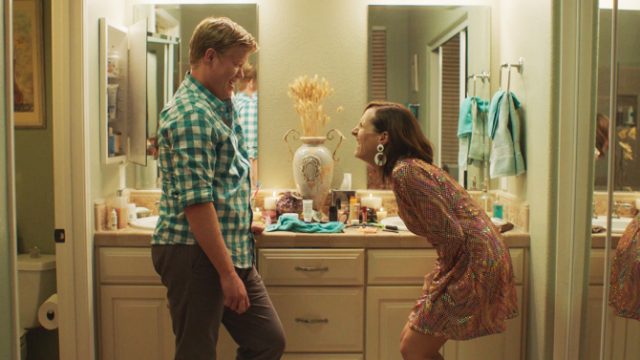If some movies can be made for other people, other movies can be made directly for you. I am entirely too close to the subject of Other People to review it without any sense of subjectivity, and without actually retelling where I am in life.
I am a single homosexual man of a certain age who has left his middle-class hometown to move to the big city in the search for community and a career. I didn’t move with family, and I created my own life out here in Seattle. Just before I saw the movie at SIFF, my mother had gone in for minor surgery to both of her knees, and I was facing possibility of my aging parents dealing with mortality. Two months later, my mother suggested she move to the city and we buy a duplex or triplex together, in part because she’s getting older, is single, and may need more help. In addition, two of my grandparents died of cancer as I was in college, and my sister had it too. All of these personal issues were coming up right as I saw Other People, a film which pushed all of these buttons.
Other People is a semi-biographical dramedy written and directed by Chris Kelly (The Onion News Network, Saturday Night Live, Broad City) about his returning home from New York City to care for his mother who died of cancer. This isn’t a spoiler. Other People opens with Joanne (Molly Shannon) dying while surrounded by her family. Their mourning is quickly interrupted by a relative calling to inquire about her health, punctuating the immediate pathos with a bit of extended humor about the bad timing and selfishness of humanity. The rest of the movie is the year leading up to this death.
David (Jesse Plemons) is a gay man who had gone off to New York City to develop his career as a comedy writer. At the request of his family, he returns home to Sacramento to help care for his mother, Joanne, now in advanced stages of cancer. By returning home, he has to deal with everything he left behind, including the other people he regards as less worldly than him even if they helped shape his world. His family makes endearingly lame jokes at him in the hopes they’ll become characters on SNL. His father (Bradley Whitford) refuses to acknowledge his homosexuality. His best gay friend seems to have gotten stuck in Sacramento. And, David holds a bit of an aloof attitude toward everything he had left behind.
I can’t tell if Jesse Plemons is a great actor or if I am just seeing myself in him. He has mannerisms of a gay man who was never one for sports. His performance is at once aloof and also understanding of the tragedy of that aloofness. It’s a tough role to pull off, but one he manages with aplomb. Still, the standout performance is Molly Shannon, who turns in a tragic, hilarious, dry, sympathetic, complex performance of a mother who is trying to hold her family together even as she knows why they’re all in the same house.
Kelly’s film finds the balance between sensitively tragic and dryly hilarious. Even as I was laughing through my fear, by the end of the movie I was ugly crying. I cared about the characters, even as I knew exactly what was coming. By opening with Joanne’s death, Kelly puts much weight on the third act of the film with the incoming known final scene weighing heavily on the proceedings. And, maybe I’m too close to the film. Maybe I’m seeing far too much of my immediate future circumstances. Whether the movie was actually good or whether it was just intensely personal, this is one of my favorite movies this year.

